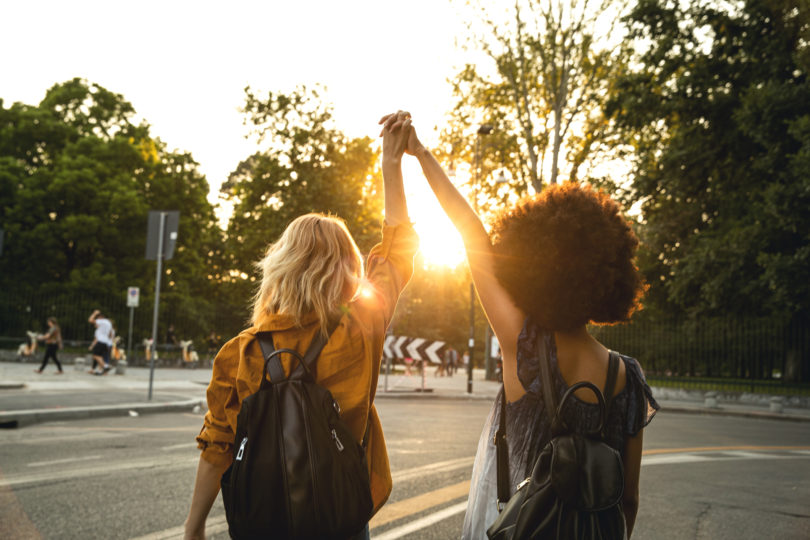Carmen Berkley is a lifelong advocate and cultural organizer. She currently serves as the Vice President of Programs for the Group Health Foundation focusing on fueling health equity outcomes in the state of Washington. You can also find her DJing in Seattle, WA under the name CarmenSpindiego. She lives in Bellevue, WA with her husband Lee and dog King T’Challa. You can follow her on Twitter @carmenberkley.
We have all been significantly impacted by COVID-19. However, the impact on Black communities and our ability to feel safe in our own neighborhoods has led to deep conversations about the other pandemic we are facing – racism and discrimination against Black, Indigenous, and other people of color especially Asian Americans – and what we as neighbors are going to do about it.
One month into the COVID-19 lockdown, my husband and I decided to incorporate daily walks as a way to help with our mental and physical health. Even in our diverse Bellevue, WA neighborhood, we learned to be cautious about walking through communities that we aren’t familiar with for fear that we’ll be questioned or discriminated against for the color of our skin.
The murders of George Floyd, Breonna Taylor, and many other Black women, men, and trans folks in their own neighborhoods created a new level of attention, outrage and support from our non-Black friends – but these instances also exaggerated the impacts on our health and well-being during one of the most challenging times in recent history. Not only are Black people dealing with the stress of being more likely to be impacted by the coronavirus due to racial biases in healthcare and vaccination access, but the post-traumatic stress of witnessing injustice against our own people will have a lasting impact on our communities.
We have an opportunity to use this moment in time to show up for each other better in our neighborhoods. Support can come through gestures as simple as a Black Lives Matter yard sign to voting for elected officials that represent equity values.
If you are interested in taking actionable steps to stand in solidarity with your Black neighbors, here are four things you can do to help change the culture of how we are treated in neighborhoods:
- Be mindful of involving law enforcement if it isn’t warranted. Calling the police on your Black neighbors could have severe, or even deadly, consequences. Data shows that we are often more harshly sentenced and incarcerated due to minor offenses. With that in mind, calling the police because of someone’s unruly dog, loud music, or frustration with a parking spot can lead to an unnecessarily negative interaction for us. If the incident taking place can be resolved without involving law enforcement, do it. Introduce yourself, explain the situation, and work together to find a solution.
- Assume good intent. As newcomers to Washington State, we have yet to meet our neighbors due to the pandemic. But in all honesty, my husband and I are cautious when we walk around our neighborhood. We’re not sure if the smiles that we see are neighborly, or if they’re curious why we are in “their” community. If you see a Black person in your neighborhood who you may not know, don’t assume that they don’t live there. Talk to them, say hello, ask when they moved to the neighborhood — in times like these, the positive reinforcement is welcome.
- Speak up! Protect your Black neighbors. The impact of overt racism, unconscious bias, microaggressions, and discrimination are realities that Black people live with every single day, and it is exhausting to deal with stares, questions, and accusations constantly. While it’s challenging for people to question your presence in a neighborhood you live in, it’s worse when someone sees a discriminatory act happening to someone of color, and they do nothing about it. If you see an act of discrimination happening in your neighborhood, speak out and make it stop. You can learn more with Nextdoor’s resources against racism.
- Real estate matters – Rent and sell to Black people. Often people say there are no people of color in Washington State, and I’m here to tell you that is not true. It’s not that Black folks don’t live in here, it’s that gerrymandering, discrimination, and renting laws have been set up to systemically block Black folks and other people of color out of certain zip codes. The way to combat this is to trust that Black people want to live in lovely neighborhoods, with great schools, and amazing grocery stores. We deserve that and more.
My hope for 2021 is we can use the energy from the last few years and show up for each other the way our neighborhoods were intended to be – healthy, happy, welcoming, and full of joy.
To connect with your local neighborhood, please login at nextdoor.com.

